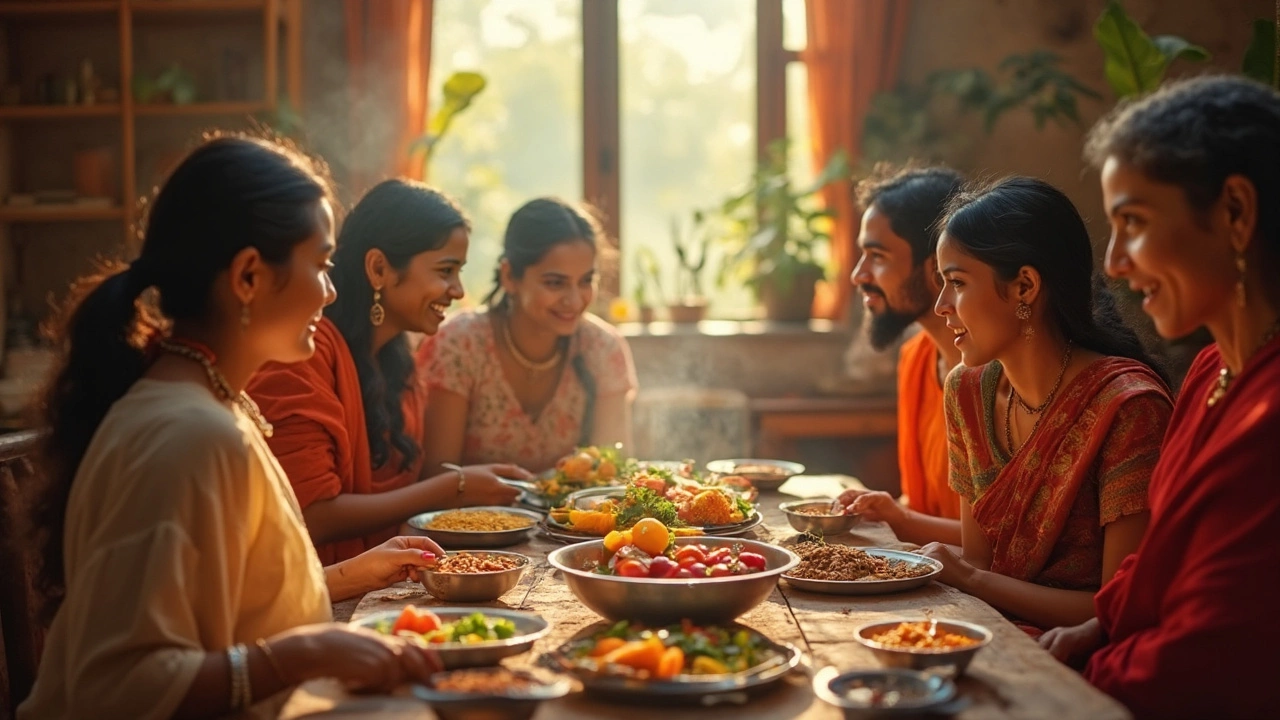
Think eating little bites all day keeps you healthy? Ayurveda sees it differently. This ancient system says our digestion runs best when we don’t keep it working nonstop. Instead, sticking to regular mealtimes gives your gut a chance to fully process food, rest, and get ready for the next round.
Why does Ayurveda care about how often we eat? It all comes down to something called "Agni"—your digestive fire. If Agni is strong, you feel light, energized, and your food gets turned into fuel, not bloating or brain fog. But if you snack or graze all day, Agni never gets a proper break. Picture stoking a fire with damp sticks every few minutes; it just smolders. That’s what frequent eating does to your digestion.
Curious how this works in real life? Let’s dig in, clear up the myths, and see what you can actually do at home without buying fancy ingredients or supplements.
- What Ayurveda Says About Meal Timing
- The Power of Eating Three Meals a Day
- Why Snacking Might Backfire
- Ayurveda Tips for Better Digestion
What Ayurveda Says About Meal Timing
Ayurveda believes that when you eat matters as much as what you eat. The idea is simple: our bodies have their own internal clock, and our digestion works best when we eat at certain times.
Traditional texts like the Charaka Samhita talk about the body's digestive fire—Agni. This is strongest in the middle of the day, around noon, when your metabolism naturally peaks. That’s why lunch should be your main meal, not dinner. Breakfast and dinner should be lighter, but never skipped.
Here’s a quick fact: Ayurveda recommends sticking to three main meals per day, spaced about 4 to 6 hours apart. This window lets Agni finish the work from one meal before starting on the next. It’s like not overloading your washing machine—you get better results if you don’t cram in too much at once.
Check out how Ayurveda aligns meals with the body’s clock:
| Meal | Recommended Time | Reason |
|---|---|---|
| Breakfast | 7–9 AM | Gentle start, as Agni is waking up |
| Lunch | 12–1 PM | Agni is strongest, digest big meal |
| Dinner | 6–8 PM | Light meal—Agni starts winding down |
This rhythm isn’t about restriction or skipping meals. It’s about syncing your eating habits with your body’s natural energy curves. Ayurveda says eating at random times or late at night stresses your digestive fire, leading to indigestion and sluggishness.
If you’re tempted to snack all day, that’s a signal to check if your main meals are balanced and filling. Ayurveda suggests if you’re truly hungry between meals, it’s okay to have a piece of fruit or soaked nuts—just don’t make it a habit.
The Power of Eating Three Meals a Day
Ayurveda’s big claim? Most people should eat just three solid meals a day. Breakfast, lunch, and dinner—simple as that. The idea is to keep your digestion running strong without overloading it. This takes a lot of people by surprise, especially if you’re used to hearing about five or six small meals, snacks, or protein bars between Zoom calls.
Here’s the gist: when you eat too often, your body barely gets to finish digesting before you toss in something new. The traditional Ayurveda schedule actually maps meals onto the times when our digestive fire (Agni) is naturally strongest—morning, midday, and evening. The classic timing? Lunch should be the biggest meal, eaten somewhere between 12 and 2 pm. That’s when both the sun and your digestion are at their peak. Dinner? Keep it lighter and aim to finish well before you go to bed.
Dr. Vasant Lad, a respected Ayurvedic doctor, says, "The digestive fire is strongest at midday, so that’s the best time to eat your main meal. Eating at regular times keeps Agni balanced well."
Okay, but does eating three meals really make a difference? Check out this simple comparison table with commonly observed effects:
| Meal Pattern | Typical Effects (Ayurveda Perspective) |
|---|---|
| 3 Regular Meals a Day | Balanced energy, easier digestion, steady hunger, fewer cravings |
| Frequent Grazing/Snacking | Sluggish digestion, gas/bloating, sugar cravings, erratic appetite |
If you’re thinking, “But I get hungry between meals!” you’re not alone. Usually, that means you might be eating meals that aren’t hearty enough, or you’ve got used to constant snacking. Try making your three meals balanced—good protein, healthy fat, and fiber. Trust me, your body will figure it out in a few days.
Here’s a quick tip from Ayurvedic tradition: give at least 4 to 6 hours between main meals. This rest period is when your body clears out the leftovers and keeps Agni strong. You’ll probably notice better focus and even fewer afternoon crashes.
- Eat your biggest meal when your digestion is strongest—lunch.
- Keep dinner lighter to avoid waking up groggy.
- Stick to water, herbal teas, or just wait between meals instead of snacking out of boredom.
Small adjustments like these help your whole system work more smoothly. Surprising how much easier daily life feels when you aren’t thinking about food every hour, right?

Why Snacking Might Backfire
Snacking sounds harmless, right? But Ayurveda has warned against it for centuries. Here’s why: your body’s digestion needs time between meals to work well. If you keep tossing in small snacks or drinks all day, your digestive fire never gets time to fully process anything. Instead of getting all the energy and nutrients from your food, you’re left with half-digested leftovers in your gut—Ayurveda actually has a word for this: “Ama,” which means toxic build-up.
Two of the most common problems blamed on constant snacking are sluggishness and bloating. In fact, a study from the National Institute of Ayurveda in India found that people who ate three meals a day felt lighter and had better digestion than those who grazed all day. People who snacked often reported more tiredness after meals and random cravings through the day.
| Eating Pattern | Reported Digestion | Common Complaints |
|---|---|---|
| Three Meals/Day | Good | Rare bloating, higher energy |
| Frequent Snacking | Poor | More tiredness, bloating, cravings |
Another thing Ayurveda points out is how your body builds up hunger hormones in a rhythm. If you’re always reaching for a snack, you never let proper hunger kick in. Eating when you’re actually hungry makes digestion more efficient and even small meals feel more satisfying.
If snacking feels like a habit you can’t break, try this: when you feel a craving between meals, drink a glass of warm water and wait fifteen minutes. Often, it’s thirst or boredom, not real hunger. If you still feel hungry after that and you know your next meal is far off, pick something light and easy to digest—like a handful of roasted seeds, not heavy fried snacks.
Sticking to set mealtimes lets your digestion rest, rebuild, and get stronger over time. Ayurveda says that when your digestion is happy, pretty much everything else—mood, energy, even skin—gets better too.
Ayurveda Tips for Better Digestion
Ayurveda has some pretty down-to-earth tips for getting your digestion on track. It isn’t just about what you eat, but when and how you eat, too. You don’t need to turn your kitchen upside down to get started—just a few tweaks can make a real difference.
- Stick to set meal times. Try to eat breakfast, lunch, and dinner at about the same times each day. This helps your body’s digestive fire (Agni) know when to kick in.
- Make lunch your main event. Ayurveda says your digestive strength is at its highest around noon. Aim for your biggest meal then, and keep dinner light.
- Don’t eat when you’re not hungry. Sounds simple, but it actually gives your digestion time to rest.
- Sip warm water. Cold drinks slow everything down. Warm water supports smoother digestion according to Ayurveda.
- Keep snacking rare. Allow at least 4 hours between meals so your last meal gets digested before the next round.
If you want to know how people actually feel, studies in India have linked regular meal times (without many snacks) to fewer digestion problems like bloating or sluggishness, especially in people practicing Ayurveda-based habits for more than a year.
| Ayurvedic Habit | Reported Benefit (2023 survey, India) |
|---|---|
| 3 meals daily, no snacks | 72% reported less bloating |
| Lunch as largest meal | 65% felt more energy in afternoon |
| Warm water with meals | 58% saw reduced acid reflux |
If you mess up your schedule, don’t stress. Ayurveda is about building habits, not perfection. Try these tips for a week and pay attention to how you feel—most people notice more energy and way less heaviness in just a few days.

Write a comment